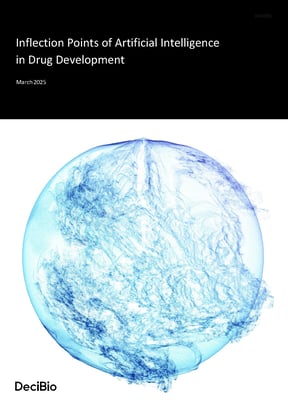White Paper
Inflection Points of Artificial Intelligence in Drug Development
This white paper examines AI's growing maturity in drug development, driven by proprietary data, increased biopharma adoption, and future advances like quantum computing.

Complete this form to receive a free copy
Executive Summary
The use of Artificial Intelligence (AI) and Machine Learning (ML) in drug R&D is not new, it evolved steadily since its initial use cases emerged in the 1990s. Today, we believe that we are entering a new maturity phase marked by shifting attitudes toward the technology. The AI-first players have progressed from using public data for point solutions to players building their moats around generating proprietary data for self-supervised foundational models. This landscape has expanded dramatically, with more AI-first companies launched during the four-year period after COVID-19 than in the previous two decades combined. This is also reflected in funding reaching a record $5.6 billion in 2024.
Business models have transformed throughout this evolution—AI-first techbios initially offered SaaS solutions before attempting to develop their own drug pipelines. Meanwhile, biopharma's engagement with AI has steadily increased, with partnership deals growing 27% p.a. in volume and 16% p.a. in average size over the past five years. Big tech companies have also entered the field with infrastructure tools and direct solutions. Within biopharma, a significant capability gap has emerged between AI leaders and followers—potentially requiring five years for the latter to catch up. Overall, this maturity inflection point is driving greater specialization and domain focus, with solutions targeting specific segments of the R&D value chain and going deeper than before. Looking ahead, quantum computing promises to enhance AI capabilities by efficiently processing high-dimensional data and identifying non-linear correlations across biological and chemical spaces, which can further enhance and speed up insight generation. With expected advancements in inference models on top of this, AI can enable our understanding of complex disease biology to previously unreachable insights.
About the Authors:

Luka Jelcic
Senior Manager, DeciBio Consulting
Luka is an experienced life sciences strategy consultant. At DeciBio, he focuses on the strategic implications of AI/ML approaches in drug R&D. His work spans go-to-market strategies, opportunity assessments, due diligence, long-range planning, and market access. Prior to DeciBio, Luka was part of the Life Sciences strategy team at L.E.K. Consulting and previously worked at Charles River Associates in London, UK. He holds a master’s degree in Chemistry from University College London.
Anastasia Christianson, Ph.D.
Managing Principal, EPAM
Dr. Anastasia Christianson is a recognized senior executive in Data Science, AI, and information technology, with nearly three decades of experience driving digital transformation in the pharmaceutical industry. She most recently served as Senior Vice President and Global Head of AI, Data, and Analytics at Pfizer, and has held leadership roles at Johnson & Johnson, AstraZeneca, and Bristol Myers Squibb. A thought leader in responsible AI governance, Dr. Christianson is currently Managing Principal at EPAM and Executive in Residence at Columbia Ventures. She sits on Strategic Advisory Boards of Wharton’s Vagelos Program for Life Science Management and TIP Global Health, and serves as an advisor to Venture Capital, Private Equity, and a number of biotech and techbio companies.

Contributors:

Rafael Rosengarten, Ph.D.
CEO and Co-founder, Genialis
Rafael Rosengarten is CEO and co-founder of Genialis, the RNA biomarker company. Before leading Genialis he spent nearly 20 years in biomedical research. Dr. Rosengarten is a board member and co-founder of the Alliance for AI in Healthcare (AAIH), a non-profit global advocacy organization. Rafael attended Dartmouth College before earning his doctorate from Yale University, where he was an NSF Graduate Research Fellow. He went on to postdoctoral training in Jay Keasling’s synthetic biology group at Lawrence Berkeley National Laboratory, Joint BioEnergy Institute (JBEI). This was followed by a National Library of Medicine fellowship in Biomedical Informatics at Baylor College of Medicine.
©2026 DeciBio. All rights reserved.